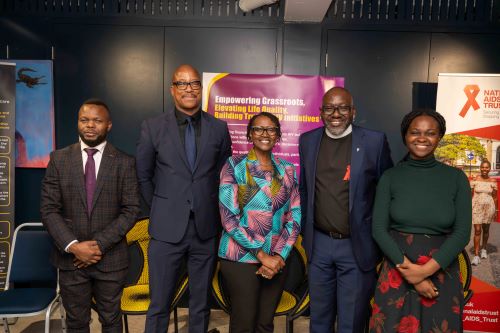BLACK-LED community organisations met at a special event in London today (December 1) to mark World Aids Day.
The event which was organised by the National AIDS Trust and One Voice Network highlighted the work of the Unheard Voices project, an independent collective of Black-led community organisations, seeking to improve the health and wellbeing of Black communities in the UK who are affected by HIV.
The project aims to end structural inequalities by ensuring Black communities living with or at risk of HIV can hold decision-makers to account, influence actions, and become part of the decision-making process.
The meeting was addressed by Winnie Byanyima, Executive Director of UNAIDS. Byanyima was visiting the UK for the launch of a UNAIDS report called Let Communities Lead. The report concluded that AIDS can be ended as a public health threat by 2030, but only if communities on the frontlines get the full support they need from governments and donors.
During the event, Byanyima and attendees from within the HIV community were treated to a performance from the Joyful Noise choir. The choir, organised by One Voice Network organisation NAZ, are an inclusive, peer support group made up entirely of people living with HIV. The choir serves as a community for HIV-positive individuals, as well as an inspiring tool to help end the stigma associated with HIV.
She told the audience: “It is through enabling communities like those I met today that we will end HIV transmissions and end AIDS as a public health threat. You light the way.
“As a black woman, I have experienced how difficult it is to make our voices heard. Your determination inspires me. Racism, sexism and homophobia are bad for our health. It is vital to let communities lead to address systemic inequalities in all aspects of life. That is how we will make sure that everyone’s right to health and social services is realised.”
Impact
By involving Black communities in decisions about their HIV care and commissioning, Unheard Voices aims to influence a health and support system which offers equitable standards of care, to reduce the disproportionate impact of HIV or HIV related stigma and discrimination.
Reverend Jide Macaulay, One Voice Network chairperson and Founder and CEO of House Of Rainbow, said: “The United Kingdom has made significant strides in combatting HIV and achieving UNAIDS goals; however, it is evident that the quality of life for Black African communities is currently at a critical low. Urgent actions are needed to allocate resources and provide support to address this issue.”
According to figures from UKHSA, despite making up a smaller number of the overall London population, Black Africans represented 26% of all newly diagnosed London residents in 2021. Black Africans were more likely to be diagnosed late than the white population (57% and 32% respectively).
Oluwakemi Agunbiade, Policy and Campaigns Officer at National AIDS Trust, said: “When community voices are included throughout the journey of HIV service design, decision-makers benefit from a new perspective on how Black people impacted by HIV can be best supported. Without involving with Black communities, health care systems are missing out on vital information to understand how best to meet their HIV-related needs.
“Whilst our upcoming report on community involvement in London HIV commissioning does highlight that many commissioners are engaging with community leaders, much more needs to be done. We strongly encourage a shift towards coproduction where community members are stakeholders with a say in their own healthcare.
“To further guide decision-makers, the Unheard Voices Report will also include best practice on how to overcome the barriers to effective genuine community involvement when designing HIV services.

COMMUNITY ENGAGEMENT: Oluwakemi Agunbiade, Policy and Campaigns Officer at National AIDS Trust (Pic: UNAIDS/R.Farrell)
Speaking about how the voices of Black communities can be actively considered in the development of policies related to prevent HIVAgunbiade said: “Meaningful engagement with Black communities living with and at-risk of HIV requires them to be involved as much as possible. This can look like making decisions on messaging for campaigns and which projects will most impactful in addressing stigma within Black communities.
“However, that does require addressing the barriers to community involvement like financial hardships and cultural barriers which prevent the most vulnerable members from having a say in what their healthcare looks like.”
She continued: “Local and national government should give community organisations opportunities to innovate to reach key populations we’ve struggled to reach in the past. By listening to black-led organisations on how to effectively implement their understanding of cultural experiences, we are allowing the people who have the trust of their local communities to lead.
“Grassroots community organisations should be funded to lead or contribute to research, service design and policy development. This ensures the unmet needs of Black communities are not an afterthought or a topic of discussion only when people want to acknowledge health inequalities.”


Comments Form